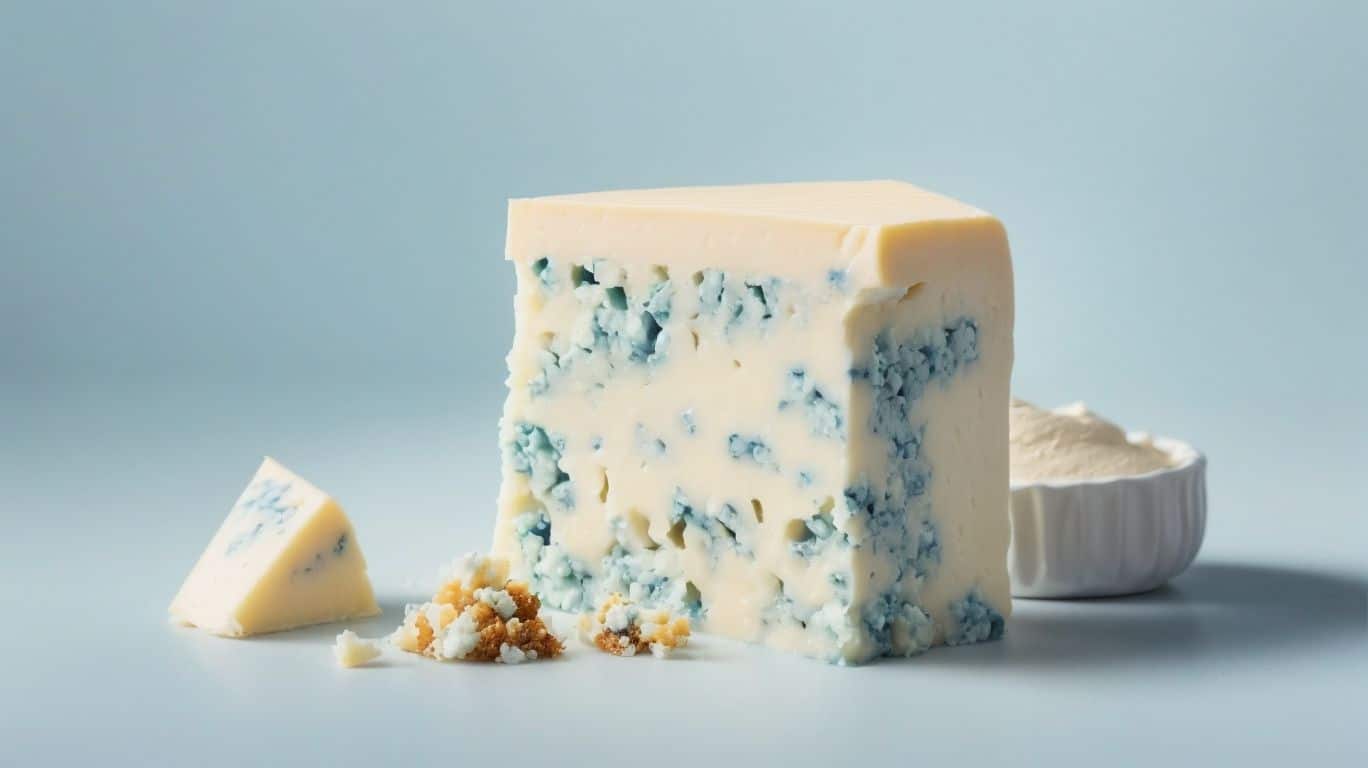The keto diet has gained significant popularity for its ability to promote weight loss and improve overall health. While following this low-carb, high-fat diet, it’s important to understand the role of dairy and its compatibility with the keto lifestyle. In particular, blue cheese, with its creamy and tangy flavor, is a subject of curiosity for keto enthusiasts. Let’s delve into the details of blue cheese and its keto-friendliness.
Blue cheese is a type of cheese known for its distinctive blue or green mold, which gives it a unique flavor profile. But is blue cheese suitable for the keto diet? To determine its compatibility, we need to consider its carbohydrate, fat, protein, and calorie content.
In terms of carbohydrates, blue cheese contains minimal amounts, making it a low-carb option for keto followers. However, it is essential to be mindful of portion sizes to avoid exceeding your carbohydrate limit for the day.
On the other hand, blue cheese is rich in fat, making it a valuable addition to a keto diet. The high-fat content helps keep you satiated, supports ketosis, and provides a good source of energy.
Blue cheese offers protein, which is important for maintaining muscle mass and supporting various bodily functions during a keto diet.
In terms of calories, blue cheese is relatively calorie-dense. While it can be enjoyed in moderation, it’s crucial to consider your overall daily calorie intake to maintain weight loss or achieve your desired goals.
Including blue cheese in your keto diet can provide several benefits. Its high-fat content aligns with the principles of the keto diet. Blue cheese also offers essential nutrients like calcium and vitamin K2, supports bone health, and contains probiotics that contribute to a healthy gut microbiome.
If blue cheese isn’t your preference or you’re seeking variety, there are other keto-friendly dairy options to explore, such as cream cheese, Brie cheese, and Gouda cheese. These options differ in taste and texture, allowing you to add versatility to your keto meal plan.
However, it’s important to consider certain considerations and side effects of dairy on the keto diet. Some individuals may have sensitivities or allergies to dairy products, which can impact their keto journey. Dairy may elicit an insulin response in some individuals, potentially affecting fat-burning and ketone production.
To incorporate dairy into your keto diet successfully, it’s recommended to choose high-quality, full-fat options, consider any potential sensitivities, and monitor your intake to align with your specific dietary needs.
By understanding the role of dairy, including blue cheese, in the keto diet and considering your individual preferences and requirements, you can make informed choices to support your keto journey effectively.
Key takeaway:
- Blue cheese is keto-friendly: Blue cheese is low in carbohydrates and high in fat, making it a suitable choice for those following a keto diet.
- Rich in nutrients: Blue cheese is a good source of essential nutrients, including calcium, vitamin K, and vitamin B12.
- Potential for probiotics: Blue cheese may contain beneficial bacteria that can support gut health and digestion.
What is the Keto Diet?
The keto diet, also known as the ketogenic diet, is a low-carb, high-fat diet that aims to put the body in a state of ketosis. Ketosis is a metabolic state where the body burns fat for fuel instead of carbohydrates. The main focus of this diet is to drastically reduce carbohydrate intake and replace it with fats. This macronutrient shift forces the body to produce ketones for energy.
One might wonder, what is the Keto Diet? Well, it is a diet that involves limiting carbohydrate consumption to a very low level, which in turn depletes the body’s glycogen stores. As a result, the body starts utilizing stored fat for energy.
The benefits of following the Keto Diet are numerous. Firstly, it has been proven to be effective for weight loss. By switching to a high-fat and low-carb diet, the body becomes more efficient at burning fat. Additionally, this diet can improve insulin sensitivity, which is beneficial for individuals with diabetes or insulin resistance. Moreover, many people report experiencing mental clarity and sustained energy levels while following the Keto Diet.
It is worth noting that before embarking on any new diet regimen, it is important to consult with a healthcare professional. They can provide personalized advice and guidance based on your individual needs and circumstances. So, if you’re considering the Keto Diet, make sure to have a conversation with your healthcare provider first.
Role of Dairy in the Keto Diet
Dairy plays a significant role in the keto diet, providing essential nutrients and contributing to the high fat content required. Here are some key points about the role of dairy in the keto diet:
- Good source of fat: Dairy products like cheese and cream play a crucial role in providing the saturated fats necessary for the body to reach ketosis.
- Nutrient-dense: Dairy products also contain important nutrients like calcium, vitamin D, and B vitamins, which play a vital role in overall health within the keto diet.
- Probiotic benefits: Some dairy products, such as yogurt and kefir, play a role in promoting a healthy gut and supporting digestion due to their probiotic content.
- Other keto-friendly dairy options: In addition to blue cheese, there are various keto-friendly dairy choices, such as cream cheese, brie cheese, and gouda cheese, which support the keto diet.
Incorporating dairy into your keto diet can offer various benefits. It’s important to consider any sensitivities or allergies to dairy and be mindful of the insulin response and fat-burning process. When consuming dairy on a keto diet, moderation is key.
Understanding Blue Cheese
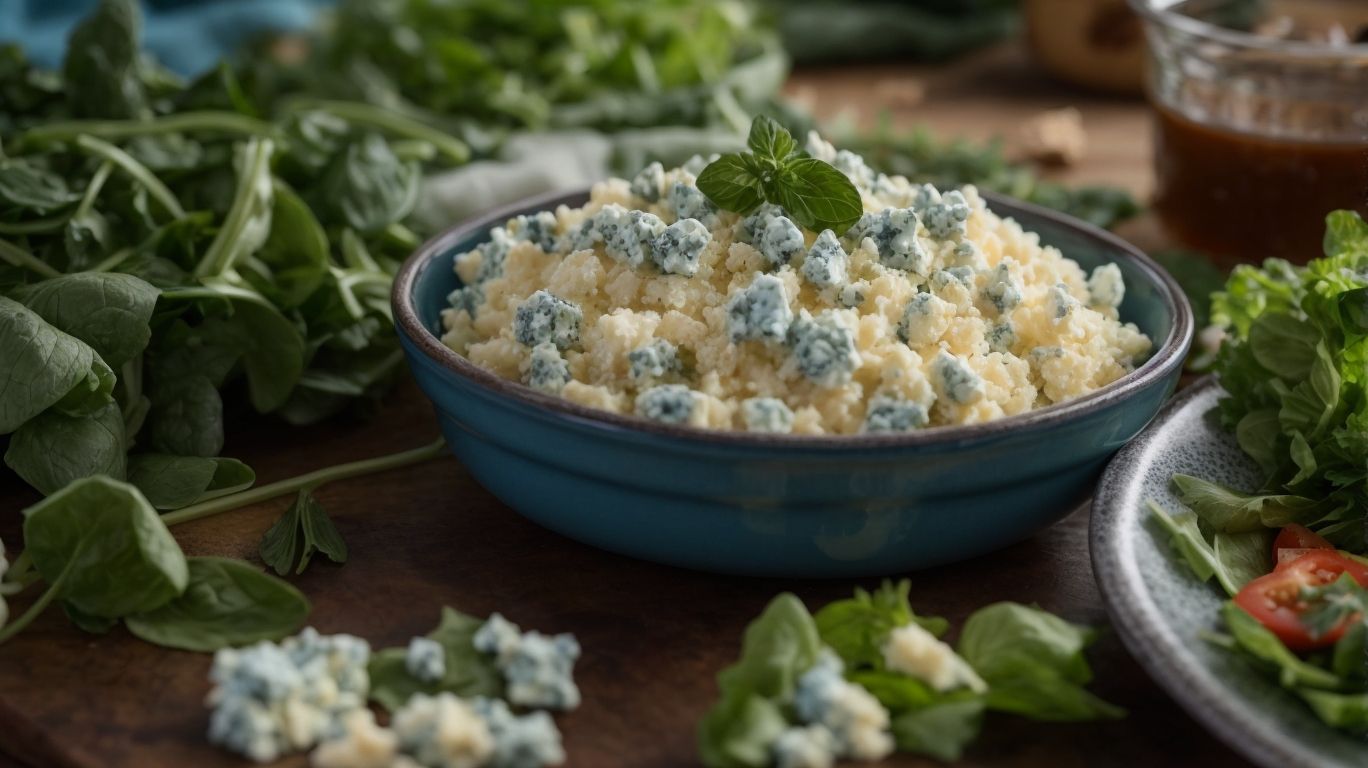
Photo Credits: Ieatketo.Com by Jose Flores
Blue cheese is a type of cheese that requires a deep understanding and appreciation of its distinct flavor and unique appearance. Renowned for its moldy exterior, this cheese is crafted using cow, sheep, or goat’s milk, and infused with cultures that promote the growth of desirable molds. The key mold employed in blue cheese production is Penicillium, which creates the signature blue veins that contribute to its character and allure. To achieve its complex and rich taste, blue cheese is carefully aged for several months. It perfectly complements an array of accompaniments such as fruits, nuts, and wines. Truly grasping the essence of blue cheese involves recognizing its unparalleled taste and texture, as well as discerning its paramount role in enhancing culinary creations like salads, dressings, and sauces.
Is Blue Cheese Keto-Friendly?
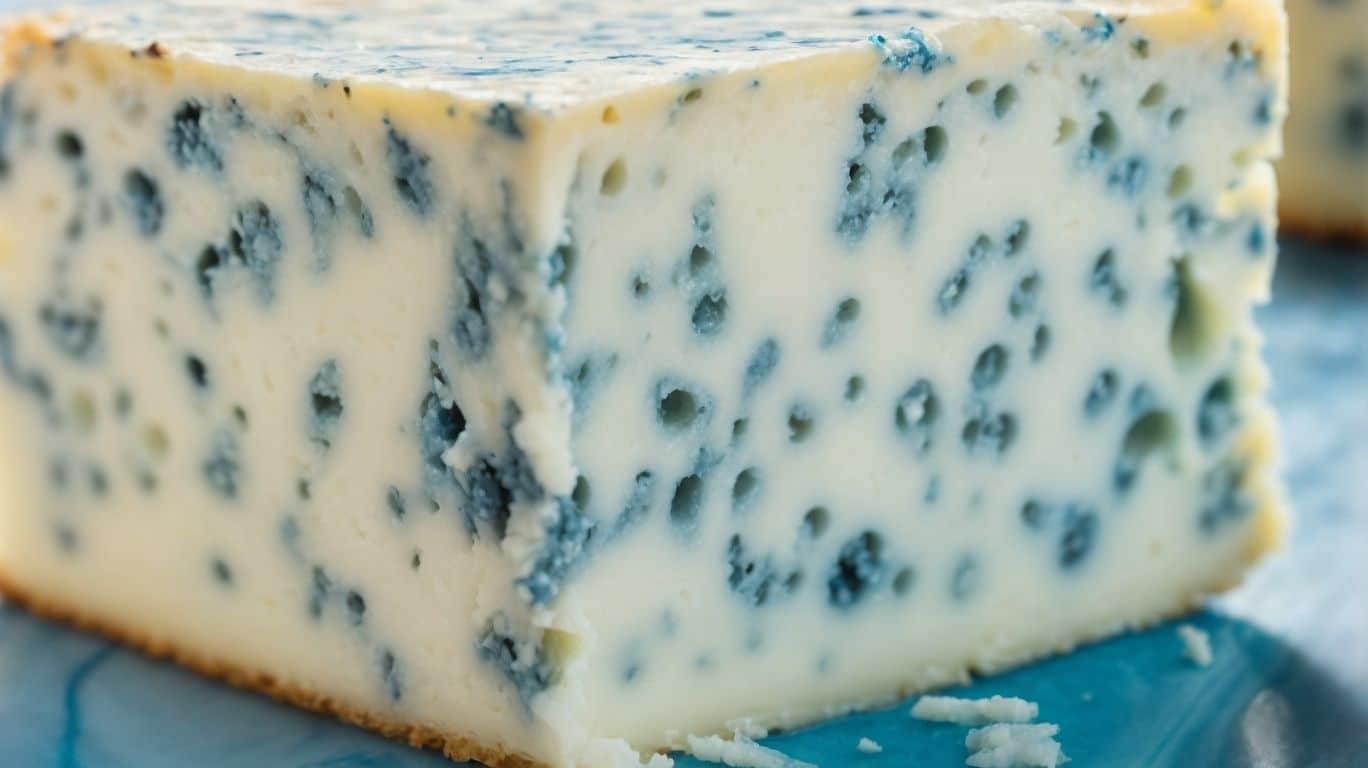
Photo Credits: Ieatketo.Com by Christopher Flores
Is blue cheese keto-friendly? Let’s dig into the creamy world of blue cheese and explore its compatibility with the keto diet. We’ll uncover the carbohydrate, fat, protein, and calorie content of this popular cheese variety. Get ready for some mind-blowing insights that will satisfy your taste buds and keep you on track with your keto journey. So, is blue cheese a go-to option for the keto-conscious? Let’s find out!
Carbohydrate Content of Blue Cheese
The carbohydrate content of blue cheese is extremely low, making it an ideal choice for individuals on a keto diet. Blue cheese typically contains less than 1 gram of carbohydrates per ounce, which is perfect for those looking to limit their carbohydrate intake. Incorporating blue cheese into your keto meal plans is effortless due to its low carbohydrate content, as it does not disrupt your state of ketosis. Additionally, an intriguing fact about blue cheese is that its distinct flavor and blue-green veins are derived from the presence of Penicillium cultures. These cultures are responsible for giving blue cheese its unique characteristics.
Fat Content of Blue Cheese
The fat content of blue cheese is a key factor to consider when following a keto diet. Blue cheese is known for its rich and creamy texture, which is due to its high fat content. In a 100-gram serving of blue cheese, there is approximately 28 grams of fat. This makes blue cheese an excellent choice for those following a high-fat, low-carb diet like keto. The high fat content of blue cheese helps to keep you feeling satisfied and promotes ketosis, the metabolic state in which your body burns fat for fuel. Incorporating blue cheese into your keto meals can add flavor and richness while staying within your dietary goals.
| Fat Content of Blue Cheese | Approximately 28 grams of fat per 100 grams of blue cheese |
Protein Content of Blue Cheese
The protein content of blue cheese is an essential consideration for individuals following a keto diet. Blue cheese typically contains about 6 grams of protein per ounce, making it a valuable source of protein. This can be highly advantageous for people on a keto diet since protein is crucial for maintaining muscle mass and promoting satiety. The protein in blue cheese is of high quality and supplies important amino acids. It is vital to moderate the consumption of blue cheese as part of a well-rounded keto diet, as it also contains fat and calories that should be taken into account when tracking your overall daily macronutrient goals.
Calorie Content of Blue Cheese
The calorie content of blue cheese, also known as the Calorie Content of Blue Cheese, is relatively high compared to other types of cheese. Specifically, a 1-ounce (28-gram) serving of blue cheese contains approximately 100-120 calories. In addition to its caloric nature, blue cheese is a rich source of fat, providing about 9-10 grams of fat per serving. Moreover, blue cheese offers a moderate amount of protein, with around 6 grams per serving. It is essential to exercise caution and consume blue cheese in moderation while following a keto diet, in order to stay within your daily calorie goals. However, the high fat content of blue cheese makes it a satisfying and flavorful addition to keto meals.
Benefits of Including Blue Cheese in a Keto Diet

Photo Credits: Ieatketo.Com by Joe Perez
Adding blue cheese to your keto diet isn’t just about creamy indulgence – it comes with its fair share of benefits too! In this section, we’ll uncover the perks of including blue cheese in your low-carb eating plan. From its high fat content to being a source of essential nutrients and probiotics, each sub-section will reveal how blue cheese can amplify the benefits of your keto journey. So get ready to dive into the delightful world of blue cheese and discover how it can enhance your keto experience.
High Fat Content
Blue cheese has a high fat content, which makes it an excellent choice for individuals adhering to a high-fat keto diet. With approximately 28 grams of fat per 100 grams serving, it offers a low carbohydrate and moderate protein content. The richness in fat found in blue cheese contributes to a feeling of satiety, thereby helping to manage cravings and achieve ketosis. Additionally, blue cheese is a valuable source of vital nutrients such as calcium, vitamin K, and phosphorus. When incorporating blue cheese into a keto diet, it is crucial to consider portion sizes and maintain a well-rounded macronutrient intake for overall balance.
Source of Essential Nutrients
Including blue cheese in a keto diet can be a valuable source of essential nutrients that support overall health and wellbeing. Here are some key nutrients found in blue cheese:
Incorporating blue cheese into your keto diet can supply you with these important nutrients while adding a burst of flavor and variety to your meals. However, it is important to consume it in moderation due to its high fat and calorie content.
Good Source of Probiotics
Blue cheese is an excellent natural source of probiotics, making it a good choice for those seeking to improve their gut health. The beneficial bacteria found in blue cheese can have numerous positive effects on the body, including aiding digestion, bolstering the immune system, and potentially even enhancing mental well-being. Adding blue cheese to a keto diet not only adds a deliciously rich flavor but also ensures the intake of these valuable probiotic benefits. There are other dairy options suitable for a keto diet that provide probiotics as well, such as cream cheese, brie cheese, and gouda cheese. However, it is crucial to consider any potential allergies or sensitivities, as well as the impact on insulin response and fat burning when incorporating dairy into a keto meal plan.
Other Keto-Friendly Dairy Options
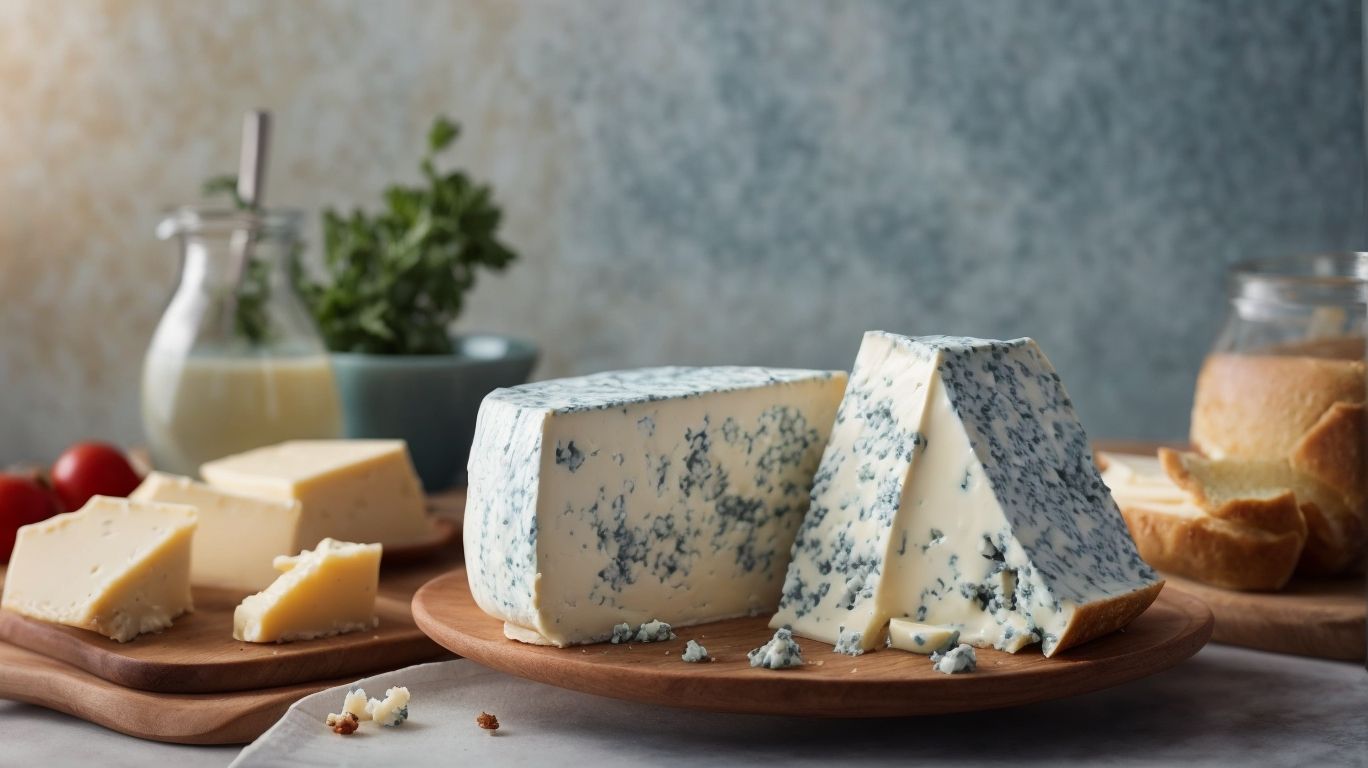
Photo Credits: Ieatketo.Com by Paul Martinez
Looking beyond the classic blue cheese, there are plenty of other keto-friendly dairy options that can add a creamy touch to your low-carb diet. In this section, we’ll delve into the delicious world of keto-friendly dairy alternatives. From the smooth and tangy cream cheese to the velvety richness of brie cheese and the flavorful gouda cheese, discover how these options can satisfy your cravings while staying in line with your keto goals. So, let’s embark on a journey of delectable keto-friendly dairy delights!
Cream Cheese
Cream cheese is a highly versatile and popular ingredient in the keto diet due to its abundant fat and low carb content. This spreadable and creamy cheese enhances the taste and indulgence of various keto-friendly recipes. Let’s break down the nutritional value of cream cheese per 100 grams:
| Fat: | 34 grams |
| Carbs: | 4 grams |
| Protein: | 6 grams |
| Calories: | 327 |
These figures clearly demonstrate that cream cheese is a fantastic choice for individuals on a keto diet as it contains low carbs and high fat content. You can incorporate it into dips, sauces, desserts, or utilize it as a delectable topping on keto-friendly pancakes or bread. However, always ensure to carefully examine the label to avoid any added sugars or fillers. Remember to enjoy cream cheese in moderation as part of a well-rounded keto meal plan.
Brie Cheese
Brie cheese is a soft and creamy cheese originating from France. It has a mild and slightly tangy flavor, making it a popular choice among cheese lovers. Brie cheese is also keto-friendly, as it is low in carbohydrates and high in fat. Here is a breakdown of its nutritional content per 100 grams:
| Carbohydrates | Fat | Protein | Calories |
|---|---|---|---|
| 0.45 grams | 28.74 grams | 20.75 grams | 334 calories |
Incorporating brie cheese into a keto diet brings several benefits. It provides a good source of healthy fats, essential nutrients like calcium and vitamin B12, and can even contribute to a healthy gut due to its probiotic content. As with any dairy product, it’s important to consider individual sensitivities or allergies. Brie cheese makes a delicious and nutritious addition to a keto diet.
Gouda Cheese
Gouda Cheese is a popular choice for those following a keto diet due to its unique flavor and nutritional profile. Here is a breakdown of the Gouda Cheese’s key nutritional information:
| Nutrient | Amount per 100g |
|---|---|
| Fat | 32g |
| Protein | 24g |
| Carbs | 2g |
| Calories | 356 |
Gouda Cheese is low in carbs, making it a suitable option for those on a keto diet. It is also high in both fat and protein, which helps keep you feeling full and satisfied. Gouda Cheese is a good source of calcium and vitamin K.
Historically, Gouda Cheese dates back to the 12th century in the Netherlands. It gets its name from the Dutch city of Gouda, where it was first traded. Today, Gouda Cheese is enjoyed worldwide for its creamy texture and versatile flavor.
Considerations and Side Effects of Dairy on the Keto Diet

Photo Credits: Ieatketo.Com by John Baker
When it comes to dairy on the keto diet, there are important considerations and potential side effects to keep in mind. In this section, we’ll dig into the impact of dairy sensitivities or allergies, as well as the connection between insulin response and fat burning. Get ready to uncover the creamy insights that will help you navigate the world of dairy while staying true to your keto goals!
Dairy Sensitivities or Allergies
Many people may experience dairy sensitivities or allergies, leading to uncomfortable symptoms such as bloating, gas, or digestive issues. If you have dairy sensitivities or allergies, it is crucial to refrain from consuming dairy products, including blue cheese, while following a keto diet.
In ancient times, dairy allergies and sensitivities were less comprehended, and individuals frequently endured the symptoms unknowingly. Fortunately, thanks to advancements in medical science and increased awareness, people now have access to information and resources that enable them to effectively manage their dairy sensitivities or allergies.
Insulin Response and Fat Burning
Insulin response is a key factor in the process of fat burning while following a keto diet. When the intake of carbohydrates is limited, insulin levels naturally remain low, which allows the body to utilize stored fat as an energy source. Conversely, when a diet is high in carbohydrates, it causes a sudden increase in insulin levels, which ultimately hinders the process of fat burning. However, by maintaining a low carb intake and emphasizing fat as the primary source of fuel, the keto diet promotes a more favorable response from insulin, resulting in an improved ability to burn fat. To further maximize the fat burning potential of a keto diet, it is recommended to incorporate regular exercise, as physical activity not only boosts insulin sensitivity but also aids in overall fat loss.
Tips for Incorporating Dairy on a Keto Diet
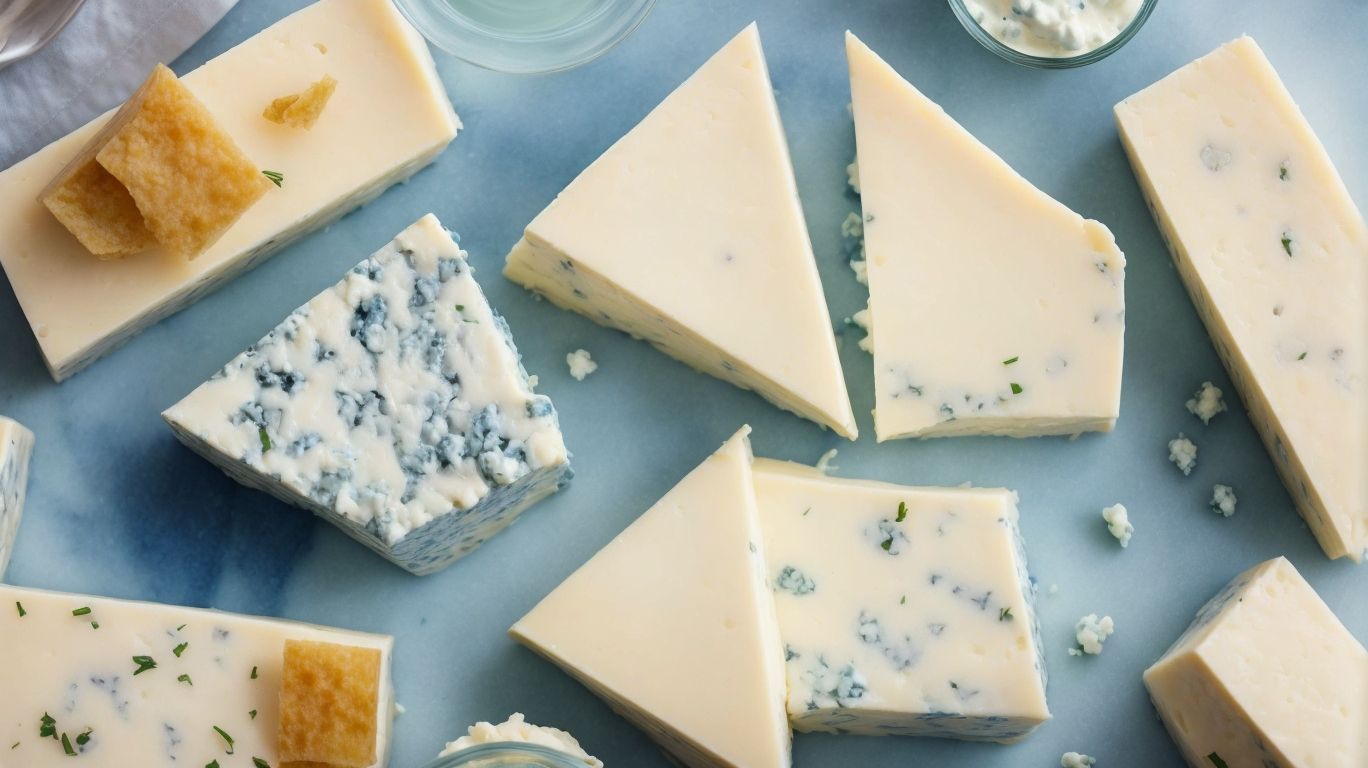
Photo Credits: Ieatketo.Com by Charles Davis
Here are some tips for incorporating dairy on a keto diet:
- Choose full-fat dairy products like cheese, yogurt, and heavy cream, as they are lower in carbs and higher in healthy fats.
- Opt for grass-fed dairy, as it contains higher levels of omega-3 fatty acids.
- Include moderate portions of dairy in your meals and snacks to maintain ketosis.
- Experiment with different types of dairy, such as cottage cheese, cream cheese, and mascarpone, to add flavor and texture to your dishes.
- Be mindful of any lactose intolerance and opt for lactose-free dairy products if needed.
Some Facts About “Is Blue Cheese Keto? A Creamy Insight into Keto Dairy”:
- ✅ Blue cheese, with 8 grams of fat, 6 grams of protein, and 1 gram of carbs per serving, is suitable for the ketogenic diet. (Source: Healthline)
- ✅ Cheese is considered a perfect keto food due to its high fat, moderate protein, and low carb content. (Source: Everyday Health)
- ✅ Not all cheeses are created equal on the keto diet, and some varieties should be limited or avoided altogether. (Source: Everyday Health)
- ✅ Cottage cheese, with 5 grams of fat, 14 grams of protein, and 5 grams of carbs per serving, is not recommended for the keto diet. (Source: People’s Choice Beef Jerky)
- ✅ Gouda cheese, with 8 grams of fat, 7 grams of protein, and 1 gram of carbs per serving, is a suitable option on the ketogenic diet. (Source: Healthline)
Frequently Asked Questions
Is Blue Cheese Keto? A Creamy Insight into Keto Dairy
1. Is goat cheese a suitable high-fat option for the keto diet?
Yes, goat cheese is an ideal keto food because it contains high fat, moderate protein, and low carb content. It is also easier to digest compared to cow’s milk cheese.
2. What are the variations in fat content and level of processing among different cheeses?
Different cheeses have varying fat contents and processing methods. For example, cheddar cheese is a popular option with 9 grams of fat per 1-ounce serving. Gouda cheese has 8 grams of fat, while blue cheese and goat cheese provide 8-9 grams of fat.
3. Are there any gastrointestinal side effects associated with cheese consumption on the keto diet?
Some individuals may experience gastrointestinal side effects, such as bloating or digestive discomfort, when consuming a high amount of cheese due to its fat content. It is important to consume cheese in moderation to avoid such issues.
4. Can you include low-fat cheese in a ketogenic lifestyle?
Low-fat cheese should be avoided on the keto diet as it typically contains higher levels of carbohydrates. The goal of a ketogenic lifestyle is to limit carbohydrate intake and focus on consuming foods with high fat and low carb content.
5. Can I indulge in cinnamon-orange cheesecake bars while following a keto diet?
Yes, you can enjoy keto-friendly cinnamon-orange cheesecake bars as a dessert option. The recipe includes ingredients such as King Arthur Baking Keto Wheat Flour and King Arthur Baking Sugar Alternative, which are suitable for a low-carb, high-fat diet.
6. Is there a simple way to identify the best and worst types of cheese for a ketogenic lifestyle?
Yes, when selecting cheese for a ketogenic lifestyle, focus on choosing varieties that have high fat content and low carb content. Cheddar cheese, gouda cheese, blue cheese, and goat cheese are considered suitable options. Avoid processed cheese or those with higher carb content like cottage cheese.

